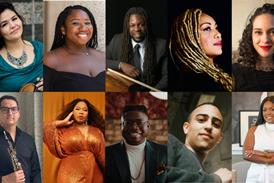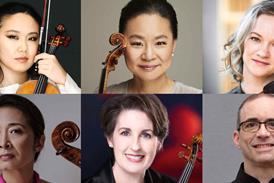- More from navigation items
- Home
- News
- For Subscribers
- Student Hub
- Playing Hub
- Podcast
- Lutherie
- Magazine
- Magazine archive
- Whether you're a player, maker, teacher or enthusiast, you'll find ideas and inspiration from leading artists, teachers and luthiers in our archive which features every issue published since January 2010 - available exclusively to subscribers. View the archive.
- Jobs
- Shop
- Directory
- Contact us
- Subscribe
- Competitions
- Reviews
- Debate
- Artists
- Accessories
'You raise me up': Women in Lutherie

An online community founded by and for women in lutherie has grown in leaps and bounds over the past three years. What are the benefits for the female contingent? By Harry White
Women in Lutherie has a profoundly simple and sincere mission statement: ‘Empowering women and girls at the bench worldwide.’ Its founders, Jeemin Kim and Jennifer Creadick, were catalysed to action in February 2021 and, in the intervening months, Women in Lutherie blossomed into a thriving Facebook community of female makers, formalised via the website womeninlutherie.org. Last year it held its first online conference, by women for women, which covered a spectrum of diverse topics from bow finishing and workshop safety to mental health and the erasure of women from the history of lutherie.
Read: Women in Lutherie to hold 2021 online annual conference
Kim is keen to stress that Women in Lutherie is a community, not an industry association. ‘We’re all about peer support and raising each other up,’ she says. ‘Women from across the globe come together on our online platforms and through our programmes to socialise, see how others live and work, encourage each other through tough days, mentor each other and share resources and experiences. Raising visibility and widening access points to the bench for women and girls is another main aim. And with our very active Instagram account, we’re truly starting to smash the age-old, widespread stereotype of what a competent luthier is supposed to look like.’
‘We’re all about peer support and raising each other up’ - Jeemin Kim, co-founder of Women in Lutherie
Why is the community important in these times? ‘It has always been important!’ responds Creadick. ‘And it could not have developed at a more important time. I think that as luthiers, as artists, most of us are drawn to beauty and peace. Sadly, ugliness in all its forms is just very easy and close to us. Our community is a respite from that.’
Kim adds: ‘I think the pandemic has made a lot of women in our community, including myself, reach a tipping point. We’re losing women at the bench where it’s already incredibly rare to see them. I feel it’s more vital than ever to build a support infrastructure that takes intersectional equity issues into account. Workplaces are changing and our industry is also changing. As we continue to grapple with how we shape and live in the post-pandemic era, our private chats are filled with gender-specific issues magnified by the pandemic, such as women’s bench time being reduced because of the need to provide unpaid labour for their family or because they are solely responsible for the safety, hygiene and emotional labour around their predominantly male communal workplaces.’
Already subscribed? Please sign in
Subscribe to continue reading…
We’re delighted that you are enjoying our website. For a limited period, you can try an online subscription to The Strad completely free of charge.
* Issues and supplements are available as both print and digital editions. Online subscribers will only receive access to the digital versions.




























